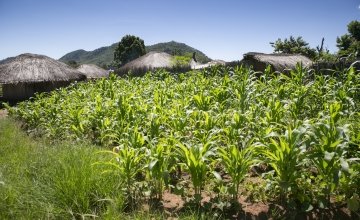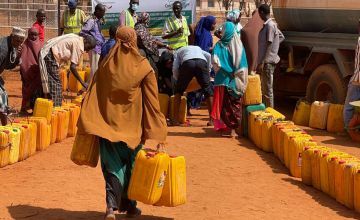
Read our 2023 annual report

Knowledge Hub
The conflict in Ukraine is a game changer, a catastrophe that is already having visceral effects across the world. The global ramifications have unfolded rapidly and will continue each day that the war continues, but perhaps the most immediate impact of the war, outside of Ukraine itself, is on the world’s food security.
There is never a time for war, but this one has arrived at a truly dreadful juncture, when global food insecurity had already reached critically high levels because of conflict and climate extremes.
In the last two years, the pandemic worsened this situation dramatically, deepening poverty, disrupting food supply chains and sending prices soaring. According to the FAO food price index, commodity prices were already rising steadily and hit an all-time high in February before the full impacts of the invasion could be felt.

Millions on the brink of famine
Food production, storage, distribution and transport systems in both countries are already heavily impacted, with exports hit hard, and the implications will be global.
This impacts on every society, but most on those who were already experiencing hunger. At the end of 2021, 41 million people were already facing the most severe levels of hunger and food insecurity, with millions on the brink of famine. The conflict is likely to exacerbate this situation drastically, especially because both Ukraine and Russia are so central to the production of basic staple foods, and fertilisers to produce those foods around the world.
Both Ukraine and Russia form a massive share of the global bread and oil basket, providing at least 25% of global wheat requirements, 20% of corn, and around 60% of the world’s sunflower, safflower and cotton seed oil.
Russia, which has now announced a ban on the export of fertiliser, normally supplies 13% of the world’s fertilisers and produces an even greater amount of the critical inputs for them; without fertilisers, the yields for some crops could immediately drop by 50%.

A worrying global picture
Ukraine, which was the source of half of the entire wheat stocks for the World Food Programme last year, has now announced a ban on the export of grains, along with sugar, salt and meat. Combine this with increasing oil and gas prices, and the global picture is a worrying one.
This means escalating food prices and massive food shortages, the knock-on effects of which will be felt most in countries that depend significantly on staple grains, oil and seed imports from these two countries.
Ultimately, people living in extreme poverty - the people for whom an increase of a few cent on a staple such as bread or rice means that meals must be cut or portions reduced or watered down - will be hit hardest. So many of these people are already at a point of abject desperation.
“Leaving the land is the hardest part”
Currently, in the Horn of Africa, 13 million people are going hungry, as the worst drought in 40 years shrivels the land, parches the livestock and forces people to move or die.

Many pastoralists are now trekking for weeks on end in search of water and food. After three failed rainy seasons, many people cannot recover and live in dire conditions on the outskirts of towns, depending on humanitarian assistance to survive. Having left everything, leaving the land is the hardest part - brutal decisions for farmers who can’t survive.
In Afghanistan, 22 million people are in need of humanitarian assistance. They are still reeling from the chaos of last year, when the coalition troops packed up and left. Since then, humanitarian assistance has been stretched, its coverage is patchy, and the country is hamstrung by international restrictions with $7billion frozen in foreign banks.
Meanwhile, food aid - normally a last resort - is needed because people have no jobs, no money and cannot afford to buy local produce.
Nothing more powerful than conflict in driving hunger
The list of countries facing severe food crises is getting longer. Syria, Lebanon, Yemen, Niger, Burkina Faso, Haiti, South Sudan – and the list goes on. Ireland is not immune to the fragility of the global food system, and this conflict shows just how deeply connected our food systems are.
The ‘new’ shocks caused by the increased costs of oil and gas have a knock effect on the cost of basic supplies around the world, and here in Ireland, the price of staples such as bread has increased by up to 30%. But the truth is that our experience pales in comparison to those caught up in conflict, the most ferocious driver of food insecurity.
Hunger drives conflict when conflict is seen as a way to survive – when land is being stolen, and cattle are raided and resources like precious metals, oil and water are at stake. And there is nothing more powerful than conflict in driving hunger.
For millions of people who are still stuck in Ukraine, the prospect of critical food insecurity - something that was completely unheard of in what was the breadbasket of Europe - is now a very real threat.
It has never been so important to recognise the fragility of our food systems, and to proactively mitigate against the worsening food security crisis. Food and peace are inextricably linked, and as a country with experience of hunger and conflict, we must play our part in addressing these twin scourges. Food security is no longer about the 811 million people who go hungry every day and the 41 million people who are at risk of famine.
It is about all of us.





